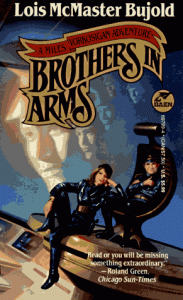By Singing Light
Pretty much everything here originally appeared at my actual blog: By Singing Light. I particularly focus on upper middle-grade and young adult books. I also enjoy adult genre books, especially speculative fiction.
Currently reading
Bujold Week: Brothers in Arms

After my re-read of Shards of Honor and Barrayar, I decided to jump ahead to the Brothers in Arms/Mirror Dance/Memory arc. Re-reading Brothers in Arms was an interesting experience–it’s actually one of the few that doesn’t re-read as well as I expected. The rest of this review is fairly spoilery, so if you haven’t read BiA and are planning to, probably skip it.
So the problem with re-reading this one is that a lot of the plot is driven by the question of Duv Galeni’s identity and loyalty. When we first meet him, knowing who he is and where he ends up, there’s the fun of recognition, and the pain of all those echoed scars on both sides. But the worry of whether he’ll betray Miles and Barrayar isn’t there, and in the absence of that worry, the plot is thinner than usual.
On the other hand, there’s a lot of fun stuff. The introduction of Duv AND Mark, in one book. Miles’s frantic juggling of identities, cover stories, and plans. IVAN! (I love Ivan.) All the relationship stuff with Elli Quinn (and a bit with Elena Bothari-Jesek). Plus, it all takes place in London, though I feel this was not explored quite as well as it could have been–granted, Miles doesn’t always get the nuances of Earth geography and history, there could have still be something. But I do like Bujold’s triple image of fathers and sons, which drives the whole series anyway, but is especially prominent here. Ser Galen and Duv Galeni, Aral and Miles Vorkosigan, Mark and who? Ser Galen? Aral? Miles? They all give a different shade to the picture.
There’s something really weird, and a bit heartbreaking in Miles essentially describing Mark before he knows of Mark’s existence. It’s also a huge coincidence, one of several which I noted but which Bujold somehow manages to carry off, in my opinion. (My favorite was Miles’s line: “Ivan, how many four-foot-nine-inch black-haired gray-eyed huncbacks can there be on this damned planet? D’you think you trip over twitchy dwarfs on every street corner.” FAMOUS LAST WORDS.) And there’s a lot, which will be explored in the next few books, with Miles coming to terms with the fact that Mark is not the little brother he always wanted, at the same time that he is.
It’s interesting to note how at this point Mark really doesn’t have a self. He’s not Mark yet, he’s not anyone yet; he’s defined almost solely in relationship to Miles, mirroring him so well that even Ivan and Elli only have minor misgivings. Which, of course, ties into the whole theme of family and defining oneself in relationship to them. It’s just that the Vorkosigan clan is a bit, well, unique. Also worth noting that in a weird, roundabout, and slightly wrenching way, Cordelia gets her herds of little Vorkosigans at last. Ow.
I did also like Duv’s slow, unwilling admiration of Miles, which I remembered from the first time I read this one. Generally, his characterisation works well for me, though he doesn’t have quite the roundedness that he gets later. Also, I loved the notes between Simon Illyan and Aral, especially when Simon lets himself be forthright.
This isn’t one of my favorite books in the series, especially after the first read. But it sets up some of the books that are, so I’m glad I’ve re-read it.












